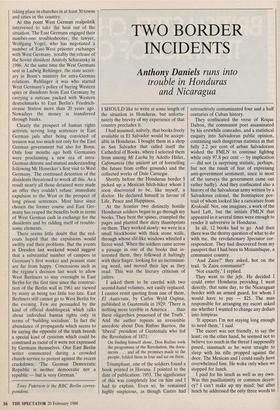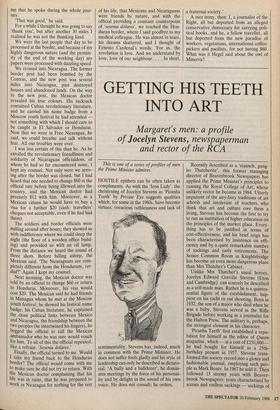TWO BORDER INCIDENTS
Anthony Daniels runs into
trouble in Honduras and Nicaragua
I SHOULD like to write at some length of the situation in Honduras, but unfortu- nately the brevity of my experience of that country precludes it.
I had assumed, naively, that books freely available in El Salvador would be accept- able in Honduras. I bought them in a shop in San Salvador that called itself the Cathedral of Books, where I selected them from among Mi Lucha by Adolfo Hitler, Cafemancia (the ancient art of foretelling the future from coffee grounds) and the collected works of Dale Carnegie.
Shortly before the Honduran border I picked up a Mexican hitch-hiker whom I soon discovered to be, like myself, a doctor. He declared himself in favour of Life, Peace and Happiness.
At the frontier two distinctly hostile Honduran soldiers began to go through my books. They bent the spines, crumpled the pages and planted their dirty thumbprints on them. They worked slowly: we were in a small blockhouse with thick stone walls, through whose slit-like windows whistled a fierce wind. When the soldiers came across a passage in one of the books that in- terested them, they followed it haltingly with their finger, looking for an incriminat- ing word, and moved their lips as they read. This was the literary criticism of jailers.
I asked them to be careful with two second-hand volumes, not easily replaced. I cannot resist quoting from one of them, El Autacrata, by Carlos Wyld Ospina, published in Guatemala in 1929: 'There is nothing more terrible in America . . . than these oligarchies possessed of the Truth.' And the author repeats an irresistible anecdote about Don Rufino Barrios, the `liberal' president of Guatemala who led the Revolution of 1871: On finding himself alone, Don Rufino took the programme of the Revolution, the docu- ments . . . and all the promises made to the people, folded them in four and sat on them.
Triumphant, one of the soldiers found a book printed in Havana. I pointed to the date of publication: 1953. The significance of this was completely lost on him and I had to explain. Even so, he remained highly suspicious, as though Castro had retroactively contaminated four and a half centuries of Cuban history.
They confiscated the verse of Roque Dalton, the communist poet assassinated by his erstwhile comrades, and a statistical enquiry into Salvadoran public opinion, containing such dangerous statistics as that fully 2.2 per cent of urban Salvadorans wished the FMLN to continue fighting while only 97.8 per cent — by implication — did not (a surprising statistic, perhaps, but not the result of fear of expressing anti-government sentiment, since in most of the surveys the government came out rather badly). And they confiscated also a history of the Salvadoran army written by a Salvadoran colonel, the frontispiece por- trait of whom looked like a caricature from Krokodil. Not, one imagines, a work of the hard Left, but the initials FMLN that appeared in it several times were enough to render it subversive in Honduras.
In all, 12 books had to go. And then there was the thorny question of what to do with me, the revolutionary Spectator cor- respondent. They had discovered from my passport that I had been to Mozambique, a communist country.
`And Zaire?' they asked, hot on the trail. 'Is Zaire communist?'
`Not exactly,' I replied.
They went to the jefe. He decided I could enter Honduras providing I went directly, that same day, to the Nicaraguan border with an armed guard, for whom I would have to pay — $25. The man responsible for arranging my escort asked me whether I wanted to change any dollars into lempiras.
`It appears I'm not staying long enough to need them,' I said.
The escort was not friendly, to say the least; on the other hand, he seemed not to believe too much in the threat I supposedly posed, inasmuch as he went straight to sleep with his rifle propped against the door. The Mexican and I could easily have overwhelmed him. He woke only when we stopped for lunch.
I paid for his lunch as well as my own. Was this pusillanimity or common decen- cy? I can't make up my mind; but after lunch he addressed the only three words to me that he spoke during the whole jour- ney.
`That was good,' he said.
For a while I thought he was going to say `thank you', but after another 30 miles I realised he was not the thanking kind.
We were the last people that day to be processed at the border, and because of my highly dangerous nature (and the proxim- ity of the end of the working day) my papers were processed with dazzling speed. We crossed into Nicaragua. The former border post had been bombed by the Contras, and the new post was several miles into Nicaragua, past destroyed houses and abandoned lands. On the way to the new post, the Mexican doctor revealed his true colours. His rucksack contained Cuban revolutionary literature, and he carried his name badge from a Moscow youth festival he had attended not something with which I should care to be caught in El Salvador or Honduras. Now that we were in Free Nicaragua, he said, we could breathe and talk without fear. All our troubles were over.
I was less certain of this than he. As he extolled the revolutionary friendliness and solidarity of Nicaraguan officialdom, of whom. he had so far encountered none, I kept my counsel. Not only were we arriv- ing after the border was closed, but I had heard that one needed to change $60 at the official rate before being allowed into the country, and the Mexican doctor had precisely $12 with him. Moreover, as a Mexican citizen he would have to buy a visa for a further $20 (cash: travellers' cheques not acceptable, even if he had had them). The soldiers and border officials were milling around after hours; they showed us with indifference where we could sleep the night (the floor of a wooden office build- ing) and provided us with an oil lamp. From the distance we heard the sound of three shots. Before falling asleep, the Mexican said: 'The Nicaraguans are com- pletely different from the Hondurans, ver- dad?' Again I kept my counsel. Next morning, the Mexican doctor was told by an official to change $60 or return to Honduras. Moreover, his visa would cost $20. The Mexican said he had friends In Managua whom he met at the Moscow youth festival; he showed his festival name badge, his Cuban literature, he explained the close political links between Mexico and Nicaragua, the friendship between the two peoples (he intertwined his fingers), he begged the official to call the Mexican ambassador who he was sure would vouch for him. To all of this the official repeated, like a refrain: `Sesenta Mares.'
Finally, the official turned to me. Would I take my friend back to the Honduran border? The official would come with me to make sure he did not try to return. With the Mexican doctor complaining that his life was in ruins, that he was prepared to work in Nicaragua for nothing for the rest of his life, that Mexicans and Nicaraguans were friends by nature, and with the official providing a constant counterpoint of `sesenta Mares', we reached the Hon- duran border, where I said goodbye to my medical colleague. He was almost in tears, his dreams shattered, and I thought of Ernesto Cardenal's words: 'For us, the revolution is love. And we understand by love, love of our neighbour. . . . In short, a fraternal society.'
A nice irony, then: I, a journalist of the Right, all but deported from an alleged conservative democracy for carrying poli- tical books, and he, a fellow traveller, all but deported from the new paradise of workers, vegetarians, international coffee- pickers and pacifists, for not having $60. What was it Hegel said about the owl of Minerva?



















































 Previous page
Previous page